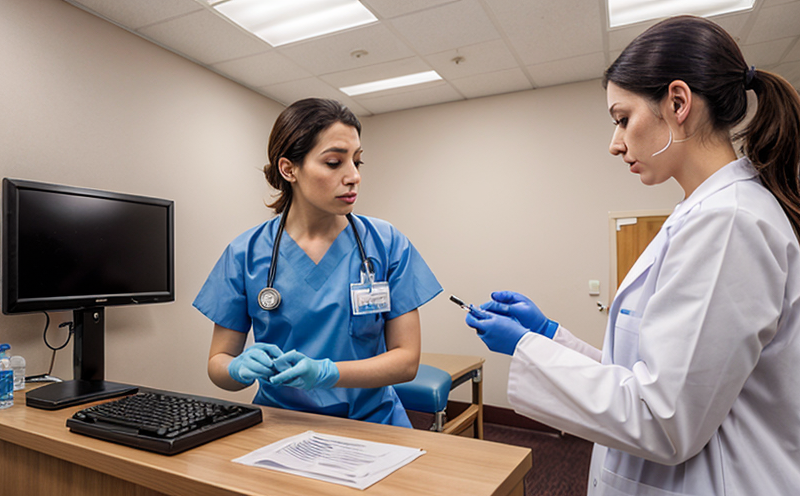Veterinary Controlled Substance Screening in Animal Clinics
In veterinary medicine, controlled substances are a critical part of managing pain and ensuring animal well-being. Proper monitoring and regulation of these medications is essential to prevent abuse and misuse. Controlled substance screening in animal clinics provides the necessary oversight for both the clinic and the pet owner. This service ensures compliance with regulatory requirements while safeguarding public health.
The process involves collecting urine samples from animals suspected of receiving controlled substances outside veterinary supervision. These samples are then analyzed using advanced analytical techniques to detect the presence or absence of specific drugs. This service is crucial for maintaining the integrity of veterinary practices and ensuring that only prescribed medications are administered.
Controlled substance screening aligns with regulatory guidelines such as those set by the Food and Drug Administration (FDA) in the United States, which mandates regular monitoring to prevent the unauthorized use or overuse of these substances. This service not only enhances patient safety but also protects veterinarians from potential legal ramifications.
Animal clinics that implement controlled substance screening demonstrate a commitment to responsible veterinary care. By adhering to industry standards and regulations, they ensure that their practices are transparent and compliant with all relevant laws. This proactive approach helps build trust within the community and fosters a culture of ethical practice.
The process typically begins with collecting urine samples from animals suspected of receiving controlled substances outside veterinary supervision. These samples are then sent to an accredited laboratory for analysis. The laboratory uses advanced analytical techniques such as mass spectrometry or immunoassay to detect the presence of specific drugs in the sample.
Once the analysis is complete, a detailed report is generated that lists all detected substances along with their concentrations. This report serves as a valuable tool for veterinarians and pet owners alike. It provides clear insights into the current state of the animal’s health and any potential issues related to medication use.
The importance of this service extends beyond just individual clinics; it plays a pivotal role in maintaining public safety by preventing the illicit distribution and misuse of controlled substances. By ensuring that only prescribed medications are used, veterinary practices contribute significantly to reducing drug abuse and promoting responsible pet ownership.
Moreover, this screening process helps identify any signs of potential health issues early on, allowing for timely intervention and treatment. This proactive approach ensures better outcomes for pets and enhances the overall quality of care provided by the clinic.
In conclusion, veterinary controlled substance screening is a vital component of responsible veterinary practice. It not only adheres to regulatory requirements but also promotes patient safety and ethical standards within the profession. By offering this service, clinics can demonstrate their commitment to providing high-quality care while contributing positively to public health.
Industry Applications
This service finds applications in various sectors including private veterinary practices, animal shelters, and research institutions. Private veterinary practices benefit from this service by ensuring that only prescribed medications are administered, thereby preventing the misuse of controlled substances.
Animal shelters also utilize this screening process to monitor the well-being of animals under their care. By regularly screening for controlled substances, they can identify any signs of abuse or inappropriate medication use and take appropriate action. This proactive approach helps maintain a safe environment for all animals in the shelter.
Research institutions involved in animal studies can also benefit from this service by ensuring that experimental protocols are followed correctly. Controlled substance screening ensures that no unauthorized substances are administered during research, maintaining the integrity of the study and protecting the subjects’ health.
Why Choose This Test
The benefits of veterinary controlled substance screening go beyond mere compliance; they extend to enhancing patient care and ensuring public safety. By choosing this test, clinics demonstrate their commitment to responsible veterinary practice and ethical standards.
One of the key advantages is the ability to prevent misuse of controlled substances. This ensures that only prescribed medications are used, thereby reducing the risk of addiction or overdose for pets. It also helps in identifying any signs of potential health issues early on, allowing for timely intervention and treatment.
Frequent screening also promotes trust within the community by showing that clinics prioritize patient safety above all else. This transparency can lead to improved relationships between veterinarians and pet owners, fostering a sense of reliability and credibility.
Moreover, adhering to regulatory requirements helps protect both the clinic and its staff from legal issues. By ensuring compliance with industry standards such as FDA guidelines, clinics can avoid potential penalties or lawsuits that may arise from non-compliance.
Competitive Advantage and Market Impact
Offering veterinary controlled substance screening gives clinics a competitive edge in the market. It sets them apart as leaders in responsible veterinary practice, which can attract more clients seeking high-quality care. This service also enhances the reputation of the clinic, making it a preferred choice for pet owners who value safety and ethical standards.
By demonstrating commitment to patient welfare and regulatory compliance, clinics can build stronger relationships with their community. Such trust is crucial in today’s competitive market where word-of-mouth referrals play a significant role in attracting new clients. Clinics that provide this service are more likely to retain existing patients due to the confidence they inspire.
The implementation of controlled substance screening also aligns with global trends towards safer and more ethical veterinary practices. As awareness about responsible pet ownership continues to grow, clinics offering such services will be seen as pioneers in setting new standards for care. This can open doors to partnerships with other healthcare providers who share similar values.





